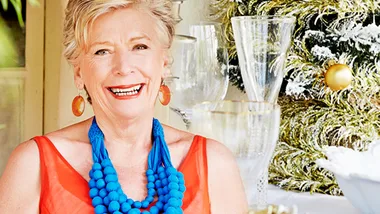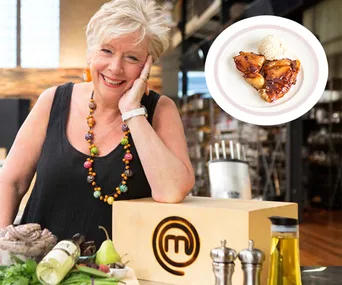The year started perfectly for Maggie Beer with three generations of her family gathered for a double-whammy party.
It was Maggie and husband Colin’s 50th wedding anniversary and Maggie’s landmark 75th birthday.
“They’re just two days apart, a very special celebration,” says Maggie.
“So we took the whole family to Noosa. We had the most beautiful time with fantastic food. Usually it’s [daughter] Saskia and I who do the cooking together, but we took our chef, Tim Bourke [from Maggie’s Barossa Valley restaurant The Farm Eatery], who’s like part of the family. I didn’t want to go out to restaurants, I just wanted to be with the family.”
Local farmers and growers who knew Maggie delivered an endless supply of fresh produce for the occasion and the spread, she says, was “amazing”.
“They chose every food in season that I love so much. We had five grandchildren – one couldn’t come – and both daughters, Sassy [Saskia] and Elli, and their husbands. It was days of celebration.”
Today Maggie says she feels so lucky to have had those cherished, carefree days when laughter filled the air. For just weeks later, her world imploded. During the night of February 14, Saskia died. She was 46.
Maggie was in “total shock”, a state that remains today. She still doesn’t know exactly what happened.
“All we know is that it was peaceful,” she tells me, choking back tears.

Maggie with her beloved daughters, Elli and Saskia, in 2017.
(Photo: Corrie Bond.)In a social media post a couple of days later, Maggie poured out her grief.
“It is with broken hearts we need to let you all know that Saskia, our beautiful, extraordinary daughter, sister, wife and mother died unexpectedly yet peacefully in her sleep on Friday night.”
Like her mum, dad and sister, Saskia’s world was South Australia’s lush Barossa Valley, an epic kitchen garden bursting with bounty that filled her with wonder.
“Food was truly important to her,” says Maggie.
As a little girl, Saskia was steeped in her parents’ fresh food ideology, and she forged a path very much in their footsteps. She trained as a chef and became a farmer with her own free-range and chemical-free business that also supported local like-minded producers.

Maggie was inspired and touched by the outpouring of love and support from across Australia.
(Photo: Corrie Bond.)Maggie says that her favourite memories of Saskia are of “us being in the kitchen together at home”, adding with a smile that “she would always want to take charge”.
The loss is visceral and incomprehensible, and when I ask Maggie how she is coping, she lets out a painful sigh.
“I don’t know that you do cope. You find things to do, to engage you. I don’t know that anyone really copes. Your life is changed forever and this year has been the worst of my life. But you have to turn your trauma into new things.”
Several thousand paid their respects, from famous chefs including Kylie Kwong and Adam Liaw to Sassy’s school friends, Adelaide Showground Farmers’ Market regulars who were used to seeing her every week, and fans who knew her from TV.
“I was so taken aback,” says Maggie.
“It was something that was so extreme – in the numbers of people and the real understanding of Saskia’s contribution. She had done so much in that short life. The support was huge and wonderful and really unbelievable.”
In the weeks that followed, the family put their heads together to create a lasting memorial, and today Maggie exclusively tells The Weekly about the unique legacy that will ensure Saskia’s memory lives on.
“We’ve created a Churchill Fellowship in Saskia’s honour, so her name will be perpetually there to in some way continue the work she was doing in terms of farming innovation,” Maggie says proudly.
The Churchill Fellowship was set up as a memorial to British wartime Prime Minister Winston Churchill and it will be the Beer family who will fund Saskia’s so it exists in perpetuity.
“The wonderful thing about the Churchill Fellowships is that they are open to absolutely all walks of life…Our Churchill Fellowship will be called the Saskia Beer Churchill Fellowship, and that’s really important to us.”

Maggie exclusively tells The Weekly about the unique legacy that will ensure Saskia’s memory lives on.
(Photo: Corrie Bond.)Because of current travel restrictions, the inaugural fellowship will be granted in 2022.
“Potential applicants apply on the fellowship site and there is a huge amount of judging done statewide, then nationally. It’s a wonderful process.”
The Beer family joins the judging. So, what are they looking for?
“It’s for travel overseas and we’re looking for innovation, something new in food or farming. We’ve made it as wide as that because we can’t even predict what might be in somebody’s mind, but you want something that’s creative and new and will bring benefit.
“Having an open mind at this stage is important. It’s about someone who wants to research or learn something that’s not available within Australia. This is not a junket. An applicant has to have planned where they’re going, who they’re going to see, what they’re going to learn. It’s very structured. The necessity is that they write a report when they return to Australia and it’s available for anyone to access.”
Read the full interview with Maggie Beer in the December issue of The Australian Women’s Weekly. On sale now.




